In the morning, the hyenas were gone and I wondered if I had dreamt their presence.
Departing from Balule, we concluded that the life of a camp keeper can be rough and left the grumpy guard a tip. He lit up like a child, receiving the gift with both hands the customary way. It would appear this was a rare occurrence for him. We had yet to visit Tsendze, where we would be reminded of the virtues of hospitality. But not everyone is a born host.
The drive north wound through an eco-zone classified as mopane woodlands on granite. It was rated as having low game density because of the sourveld grasses that are unpalatable. The bushes were high, rarely allowing a view of the horizon and shrinking our environment to the close proximity of the road. Very little happened, nothing moved.
Gratefully, about half-way to our destination in the vicinity of Letaba – a camp we were scheduled to visit four nights later, we crossed the Letaba River and again stopped on a beautiful bridge.
Our timing was impeccable as a huge herd of elephants was appearing on the south bank, slipping and sliding down the dust of a steep gully. They crossed the river in front of us. The scene was epic; it was like being whisked inside an HD documentary, with the added bonus of a breeze on our face, the now familiar but strange smell of the bush, and a comforting sun on our backs. The crossing took some ten minutes, and then the river was deserted again.
We pondered our luck, and the importance of timing. There might not have been much occurring all day on this bridge, but we had arrived at precisely the right moment. It was a sobering reminder that in such a gigantic park one had to be very alert and tuned into nature, in addition to being plain and simply lucky, to avoid missing its essence; because most of the time, nothing happens.
Well, something else actually did happen. Marie, who was scanning the river banks with binoculars, spotted a trio of rangers walking along the water far in the distance. They were heavily armed and likely involved in the on-going war against rhino poachers. One of them threw a rock at a hippo, probably to make it keep its distance. Hippos are, after all, considered to be one of the most dangerous species in Africa. No kidding.
The road followed the river bed for a while, but soon mopane reappeared and engulfed us for hours. Our drive became almost boring, if such a thing is possible in a place like Kruger. We jokingly began giving names to repetitive events. A lilac breasted roller sighting became a numbered LBR, the count to be reset to zero every day. Hippos were officially nicknamed beach ticks. Wildebeests were guh-noo’s, from our previous Kgalagadi expedition and a references to the Muppets.
And our reaction to the mopane landscape, after a careful study, was labeled mopane syndrome – a state of latent depression and apathy, characterized by rare bursts of exaggerated interest at the sight of a tree squirrel or the one-hundred-fifty-thousand-and-forty-third impala. We discussed how eventually seeing lions might feel, and concluded that we would then be suffering from PMS, post mopane syndrome.
Mopani was reached in early-afternoon. So-called because of the mopane veld surrounding it, the camp is located on a hill some five kilometers north of Tsendze. We performed the ritual remote check-in and fueled up. Mopani was a large camp crowned by a baobab located at its epicenter. Finally, I had a chance to walk up to and touch the enormous tree, even though actually a modest size specimen. Picking up some of its fruits, we brought them with us for a future experiment.
Staring at the leafless tree spread out against a deep blue sky, I attempted to connect the dots between my experience of the moment and plain reality. I was as excited as a kid in a candy store and yet most people probably drove or walked by without noticing anything.
Then I remembered that I had brought much baggage with me here, and would leave some bits behind too. It was the meaning that made the difference, not the raw matter. Bark is bark, but a biochemical storm in my brain was setting it on fire, fueled by memories and past associations. I would never really be able to share this. Even a picture would look ordinary, it was just a large tree. But I was seeing what I had wanted to see all my life.
It took me a while to understand that the window of Africa, like the window on a train rushing through the night, is a distorting mirror that partly reflects a viewer’s own face.
Paul Theroux, The Last Train to Zona Verde
It was mid-afternoon when we arrived at the Tsendze Rustic Campsite, eager to pitch our tent and relax, as we were going nowhere for two nights.
The camp gate was closed shut once more, but intentionally unattended this time and a sign simply reminded visitors to close the gate back behind them. We drove in and had to admit that the camp’s reputation for being very bushy was in no way overdone.
We had heard from our Balule neighbors who had preceded us to Tsendze that they had had an agitated stay here, an elephant having ventured inside the fence. We had not known whether to laugh or take them seriously and now looked around us hesitantly. Should an elephant be in the camp, it mostly likely would not even have been visible until it stepped right over our tent. I downplayed the veracity of that story and argued that these people had probably meant to say that elephants had been close to the fence. Outside of it.
The reservation from SANParks had led us to believe we had been assigned camp site number six so we proceeded to that spot, but found it occupied by a caravan. We were taken aback. Tsendze being isolated, it would be hard to sort things out. A long troubleshooting process followed, involving much advice from other campers – most of which centered around finding the famous Rodgers, camp attendant and local hero. He, they said, would sort it out.
We knew about Rodgers Hobyane who was legend in the field and had received multiple SANParks and hospitality awards, but finding him on foot in a camp where one cannot see further than a few thick trees took a while. When Roger finally appeared, he listened to our concern with a smile and indeed sorted the quid pro quo out in a matter of seconds: we had merely read the reservation wrong.
“The number six is the camp’s code,” Rodgers explained good-humoredly, “not the tent site. Most newcomers end up at site six and are baffled.”
We nodded with tentative relief.
“They numbered the camps from the top down,” he explained again apologetically as he drew a map in the air with his arms. “This happens to be six. But your site number is actually written on your check-in ticket from Mopani.”
Blushing, we fumbled for said ticket, which we had forgotten about. There it was. Number 19. We had a home. We could proceed.
But we did not. Rodgers had launched into a long conversation, monologue-style. It would be the first of many. He had a friendly, outgoing personality and obviously cared deeply for his camp, his guests – and his growing popularity. When we managed to say good-bye for now, we were a little breathless. From listening so much.
We pitched in, setup, spread out and sat down. Lounging with no immediate driving to do was a bit intoxicating.
Rodgers, we soon realized, pushed his duties to the next level and he would make a point to tour the entire camp twice a day to salute campers and chat with everyone. Around 5 or 6 PM, as the day was turning to night, he dropped by and having inquired if everything was all right, he began – and sustained – the conversation, well into a darkness repelled by our headlamps.
We learned that he was on Facebook, having received from generous visitors various internet connection tools. He now had a smart phone with a camera, a laptop, and was friends with many a fan on the web. He was very grateful for those donations, having ascended to his current situation from a local upbringing, and if his autobiographical story was a barely disguised pitch to qualify the leads that we were, it was done in a natural, openhearted way. But worried for our bredie that was simmering on the braai, we eventually wiggled our way into a good night.
Candles lit our dinner and we sipped red wine brought from Cape Town. Carrying a case of wine on road trips has become a tradition of ours, one which once cost us a comical bribe in Namibia, and later forced us to leave bottles hidden in the bushes of Golden Gate National Park before entering Lesotho. The dinner over, we left the dishes soaking for the next day’s wash and went to bed.
At some point in the night, I was half-asleep when I felt Marie turn suddenly on our air mattress. The inside of the tent was pitch black but I could sense that she had risen on an elbow and was listening. I knew all too well that the noises of the night are always amplified by a tent’s enclosure, but I raised an ear too just in case. Silence was perfect for a moment, then there was a definite crushing sound, not too far. A large branch had been broken from a tree.
“Elephant,” Marie whispered.
The night answered with an even louder crash, sounding dangerously close. There was no doubt that at least one elephant was out there, tearing branches off or even breaking entire trees. The only question that remained was whether that was happening outside or inside the camp.
“Sound carries far in the dark,” I said softly, “In most likelihood they are outside the camp.” But I couldn’t be sure. The Balule neighbors’ story was fresh in our minds. I grabbed my headlamp and got up without turning it on, to remain somewhat invisible. I unzipped the tent door as stealthily as I could, exited and closed behind me. Listening intently with an open mouth, I scanned the darkness for clues.
I was given none. There was no sound, no motion. The air was still and the night peaceful again, only punctuated by the call of an owl that would be up until darkness faded.
I slipped back into the tent and eased under my sleeping bag, just in time to hear loud trumpeting echo nearby, unmistakably elephantesque and angry-sounding. The giant nearby was talking, or calling. It was impossible to know if there were more than one and there wasn’t much to do other than be watchful and ready for the unexpected. Granted, I said to myself, elephant calls always sound threatening, but they were probably simply telling mouse jokes to each other. But was the fence electrified?
Eventually, after much noisy presence, the elephants went away and we fell asleep. Getting up in the morning, we almost expected to see downed trees around us but of course everything was normal. We felt silly for having worried. I felt sorry for our ancestors the cave people who had gone through this every night for millennia.
Rodgers came by at dawn with his partner Elina to clean up our braai ashes, as it is done in all camps. However their cleaning method was above average and the braai was left spotless. We asked them whether the elephant-in-the-camp story had been true. To my surprise, the answer was yes. Elephants had thrown down the fence which had not been electrified at that time and walked into the camp. “It has all been repaired now,” Rodgers added, reassuring. We wondered if indeed it had, but were not willing to test the fence ourselves. Nothing was said about the method used to push the animals back out.
We packed up our kitchen and drove to nearby Mooiplaas picnic area to have breakfast in the open. The picnic spot is actually located right against the Tsendze fence but there is no access from inside the camp and one must drive a couple of kilometers in a loop to get there. We rented an extra gas burner from the attendant along with a large skottel, and enjoyed the luxury of eggs and toast with our coffee.
Apart from birds, we did not see a single movement down in the small river bed, but large footprints suggested that the night elephants must have come this way towards the camp.
Our next drive took us north to very dry pans where zebras were playing in the dust. Later we found a couple of elephants drinking from a cistern at one of the few remaining wells. They were splashing themselves and clearly enjoying the rinse, and reminded me of kids playing in the spray of a New York City fire hydrant on a hot summer day.
We crossed the Tropic of Capricorn, by 23°26’18” of latitude south. A sign allowed careful excursions out of the car, at one’s own risk since one might die doing so. I took a souvenir snapshot. I like that shot almost as much as that of Cape Agulhas, for what it means. Legendary places, boundaries pushed.
Back in Tsendze we spent time doing laundry and washing dishes. The camp had open sky showers and I took one of the most enjoyable showers of my life under tall trees, the sun shining at an angle and creating an actual rainbow around me.
Then we began planning our next day’s drive up to the Bateleur Bushveld Camp which would be our northernmost leg of the trip. But we were feeling uneasy about it and after a brief discussion, Marie, who had arranged the bookings and felt responsible for the fact that we had not yet seen a feline – a silly concern as she had done a masterful job, suggested that we might want to reevaluate our route.
Bateleur was located in the same mopane zone and while baobabs would become more frequent in the north, there was very little else to look forward to in terms of game. In addition, the drive back south to Letaba the following day would be the longest of our Kruger drives, all through mopane.
It was late afternoon. I jumped in the Landcruiser and rushed to Mopani where a very friendly staff member did some checking for me. The easiest would have been to simply add a night in Letaba, but it was fully booked. Nearby Olifants, however, still had an available bungalow. It would mean driving south past Letaba for a night, than back up some 30 kilometers, but we knew and liked Olifants and the perspective of another night over the river appealed deeply. I booked it.
It was with a sigh of relief that Marie learned we were headed south and we celebrated with a G&T while cutting open a baobab fruit to taste the sour chalky flesh. Towards the evening, the wind picked up strongly and when dinner was ready, so much dust was swirling around that we setup our table on the lowered back door of the Landcruiser, sheltering downwind from it, and were able to keep our food from filling up with sand, and the candles lit.
By the time we went to bed, the wind was howling. Our tent was being swung in all directions, and I had to get back up in the dark to add a maximum of pegs and more side lines to steady it. Even with this done, the wind would slide under the tarp and hit us as hard as a wave crashing on a boat’s deck.
I had rarely seen such strong wind outside of a tropical storm or hurricane. It would come in waves and we could hear their roaring approach in the trees, progressively louder as they got closer. At the gust’s peak, the noise was so loud it made your heart accelerate instinctively. I remembered Jon Krakauer describing the high altitude wind as the “roar of a squadron of B747’s” and felt humble.
It was another long night. We worried that the branches that had not been eaten by elephants the previous night might now break and fall on our tent. Lights were flickering on and off in the camp as people became concerned and got up to tighten, batten down, latch and secure.
By morning, though, the air had settled and the world was calm again. A fine sand dust had worked its way everywhere. It was in the tent, in our mouths, in our dishes, in our clothes, in bags left open, in and out of the car.
We thanked Rodgers who didn’t seem too impressed by the night’s wind as he had a solid house. He showed us a bonus owl and went into another lengthy tirade. As it turns out, Elina calls him “Talk-Talk”. When we managed to escape, slightly dizzy and needing to digest all the information provided in raw batches, we were silent for a while, processing Rodgers. Over.
As we drove steadily south, the predominant mopane syndrome kept us yawning for action, and a new plan emerged in our minds. From Olifants, rather than backtracking north to Letaba, we would if possible add a night in southern Satara, at the heart of lion country.
To my bewilderment, even the magical sight of hippos and buffaloes had turned casual. The human mind is easily fooled into boredom by repetition, and tends to seek novelty above all things. Where repetition could actually yield intimate knowledge, it is replaced by a thrill-seeking quest for new sensations. We want our imagination to be tickled, our senses probed. And somewhere along the way, we lose the path to wisdom.
But on that day of June 2013, as we drove through the dense bushes of African wilderness, the tall head of giraffes poking through vegetation like skyscrapers out of fog, elephants materializing so close to us that their spread out ears made our hearts skid and our accelerator foot heavy, wisdom had lost a small battle with greed.
We just wanted to see some bloody lions!
«Slingshot to Kruger» Series
Want to read the entire series of stories? Start here
Already reading sequentially?
Previous story: Slingshot to Kruger, Part 5 – Interview with the Hyena
Next story: Slingshot to Kruger, Part 7 – In Lion Country
Marie’s recount: Kruger National Park
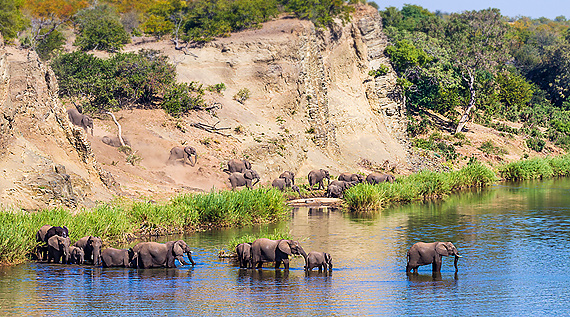
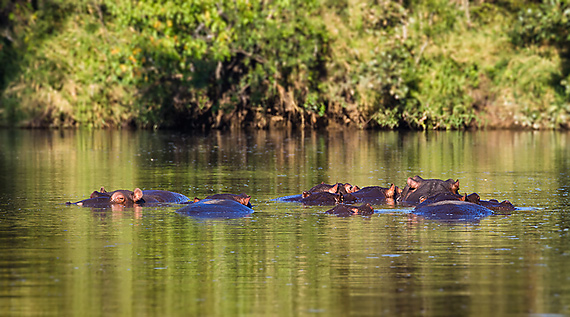
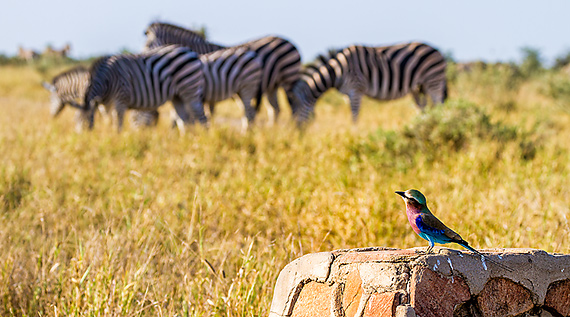
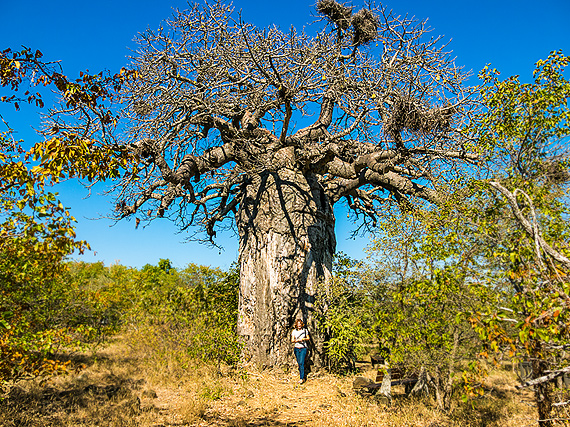
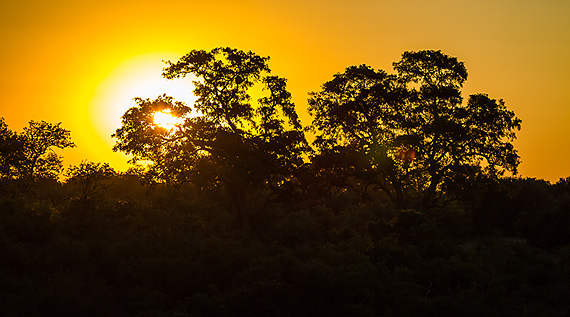
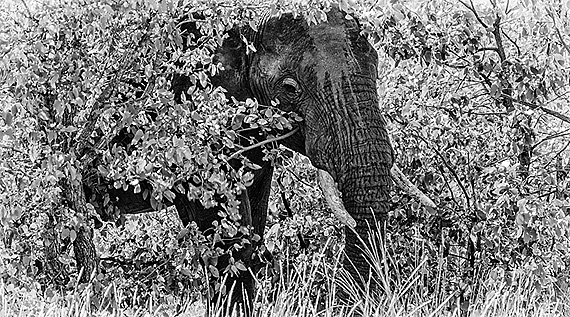
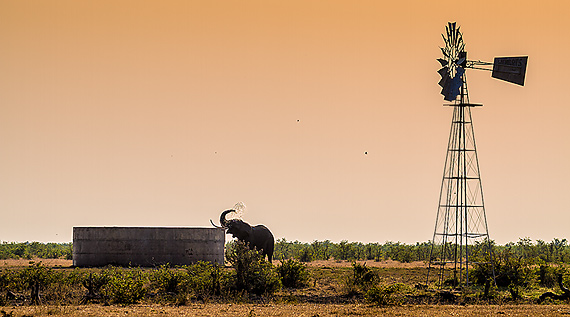
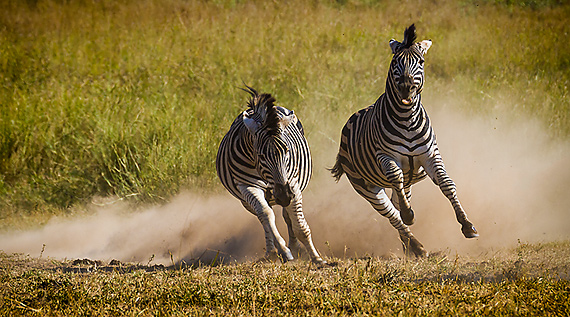

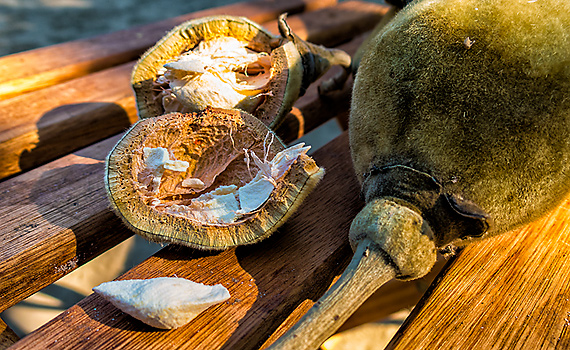
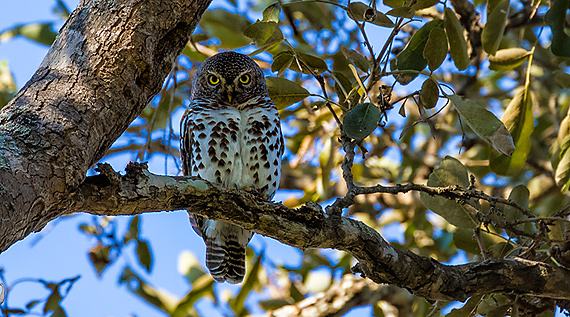
Comments
Marie
Vince
Dreamer
Vince
Andrea Weiss
Vince
Lisa
Vince
Marisa
Paul W
Vince